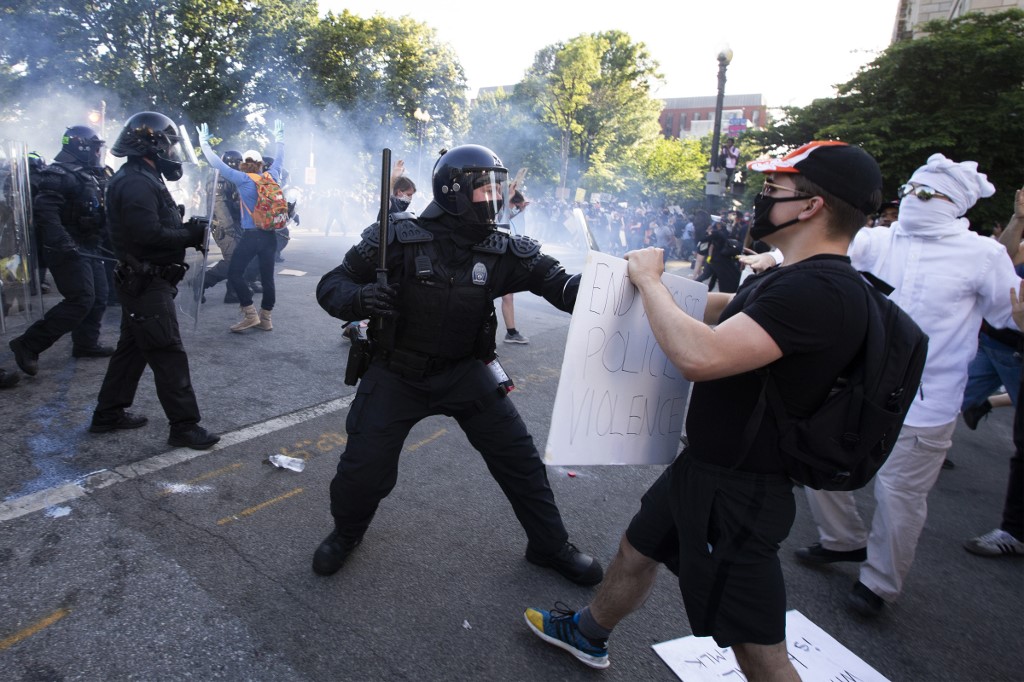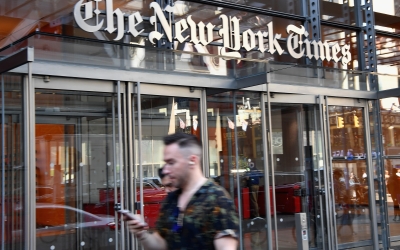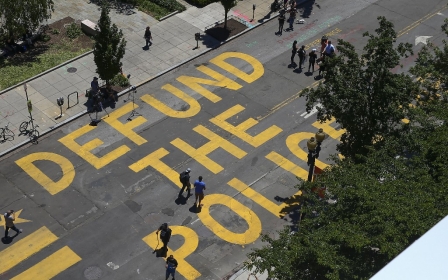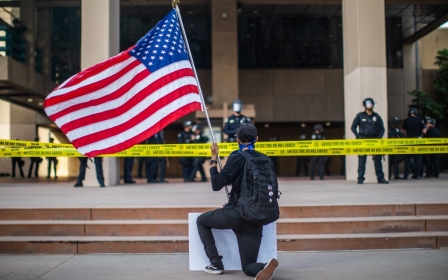When the New York Times brings its support for US militarism home

In Stanley Kubrick’s masterpiece antiwar satire Dr Strangelove or How I Learned to Stop Worrying and Love the Bomb, the eponymous Dr Strangelove (one of three virtuoso performances by Peter Sellers in the same film) is a deranged, wheelchair-confined ex-Nazi rocket scientist who is now a US presidential adviser.
He keeps forgetting he is no longer in Germany, and instinctually extends his crippled right hand to give the Nazi salute before suddenly remembering and, with his other hand, trying to pull his forgetful hand down.
That image comes to mind as an apt metaphor for the New York Times these days, momentarily forgetting that the people protesting outside its Manhattan offices, as around the US and around the world, are not Afghans, Iraqis or Palestinians, but Americans.
The massive Black Lives Matter uprising, triggered by the sadistic killing of George Floyd, has caught the “paper of record” by surprise, and in a moment of anxiety, it exposed its cards.
Hands in the cookie jar
New MEE newsletter: Jerusalem Dispatch
Sign up to get the latest insights and analysis on Israel-Palestine, alongside Turkey Unpacked and other MEE newsletters
The editors of The New York Times are so used to lending their ardent and systematic support to US militarism around the globe that they suddenly let the cat out of the proverbial bag by giving space to a racist warlord, Senator Tom Cotton, who demanded that Americans who are protesting injustice be crushed by the US military.
The story is quite instructive, for as the main organ of US liberal imperialism around the globe, the New York Times is in deep waters these days. Its dirty hands are caught inside the cookie jar of aiding and abetting naked and brutal militarism, whether by its favourite settler-colony, Israel, in Palestine, or by the US around the globe.
The revolt inside the Times itself became impossible to silence, so the newspaper retracted the piece and the editor in charge of the editorial pages was forced to resign
The article by Cotton, a fanatical ally of Donald Trump, titled “Send in the Troops”, asked the US president to invoke the Insurrection Act of 1807 and order US military forces to crush the uprising launched not only in response to the brutal murder of Floyd, but also against the systemic racism of which this killing in broad daylight is but one manifestation.
There was a swift reaction to this blatant act of encouraging militarism, first and foremost by the African-American employees of the New York Times itself. An order to crack down on US citizens exercising their constitutional rights would in fact endanger the safety of the staff of the very paper that had given voice to it.
The revolt inside the Times itself became impossible to silence, so the newspaper retracted the piece and the editor in charge of the editorial pages was forced to resign.
Facilitating US militarism worldwide
So far, so good - and the New York Times was only too eager to move on, but the incident exposes a much more serious issue: namely, the systematic way in which the Times has encouraged, rationalised and justified US militarism around the globe.
Edward Herman and Noam Chomsky’s classic text, Manufacturing Consent: The Political Economy of the Mass Media, points precisely to the propaganda function of leading corporate media, such as the New York Times, in facilitating US militarism worldwide. Endorsing the same militarism on the home front was no exception; it just scandalised the rule.
Cotton’s demand to crack down on protesters was published on 3 June, followed by a 5 June retraction on the pretext that the piece “fell short of our standards and should not have been published”. That is the sickest joke of the whole spectacle.
The piece in fact fits perfectly with the sustained discourse of the Times supporting US militarism - though mostly around the world and not on the home front. That was the paper’s fatal faux pas.
The retraction did not completely work, and on 7 June, the Times announced that James Bennet, its editorial page editor since May 2016, had resigned effective immediately.
Was this incident something short of the New York Times standard? Absolutely not. It was a perfectly standard operation; they just mistook US cities for those in Iraq, Afghanistan or Palestine.
Justifying mass murder of Palestinians
As Nathan J Robinson pointed out in Current Affairs, “the New York Times op-ed page continued its long tradition of publishing some of the worst opinions ever held (previous lowlights include ‘Bomb North Korea, Before It’s Too Late,’ John Bolton’s ‘To Stop Iran’s Bomb, Bomb Iran,’ and Blackwater billionaire Erik Prince soliciting new business by advocating the privatization of war)”.
What Robinson leaves out is the fact that in the case of North Korea, Iran or the mercenary merchant of death Erik Prince, these are wars with foreigners, not with Americans.
Similarly, at Mondoweiss, Philip Weiss pointed to at least four times the New York Times has openly encouraged the slaughter of Palestinians on its opinion pages, citing chapter-and-verse pieces by Bret Stephens, Shmuel Rosner, Matti Friedman and Thomas Friedman that encouraged and justified the mass murder of Palestinians.
But the Times’ advocacy of militarism is not limited to Israeli carnage against Palestinians. When it comes to US warmongering in Afghanistan and Iraq, the Times has not been an innocent bystander doing objective journalism.
The world remembers well how the Times gave ample space to Judith Miller to manufacture false evidence against Saddam Hussein. Howard Friel and Richard Falk’s The Record of the Paper: How the New York Times Misreports US Foreign Policy, and before that Edward Said’s Covering Islam: How the Media and the Experts Determine How We See the Rest of the World, have given full details of the centrality of the Times in US and Israeli warmongering.
Fascistic proclivities
There is an integral link between US militarism around the world and its fascistic proclivities at home. The New York Times has just exposed itself to be a facilitator of both.
In a Guardian piece titled “Yes, American police act like occupying armies. They literally studied their tactics”, Stuart Schrader succinctly argues: “Every overseas war has reshaped policing in the United States, including by filling the ranks of police departments with veterans and pushing surplus materials into their hands. But many campaigns abroad have also entailed policing civilian populations, with US experts advising other governments while also learning lessons to repatriate in the process.”
It is only after the fact, when they are caught red-handed, that they remember they need to preserve their liberal militarism for foreign lands
The leading editors of the New York Times see mostly Black people demonstrating outside their windows, and their gut reaction is the same as their reaction to Palestinians being gunned down by the Israeli settler-colony, or Iraqis or Afghans being killed under US bombs.
It is only after the fact, when they are caught red-handed, that they remember they need to preserve their liberal militarism for foreign lands, for another rainy day when the US or Israeli army goes on a rampage on targets in Asia, Africa or Latin America.
The views expressed in this article belong to the author and do not necessarily reflect the editorial policy of Middle East Eye.
Middle East Eye delivers independent and unrivalled coverage and analysis of the Middle East, North Africa and beyond. To learn more about republishing this content and the associated fees, please fill out this form. More about MEE can be found here.







